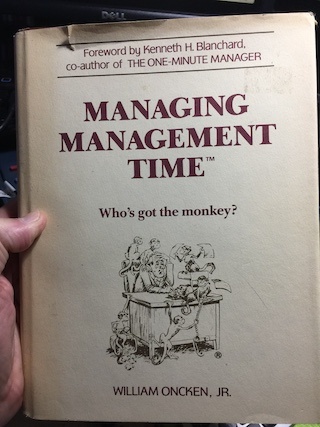Podcast: Play in new window | Download (Duration: 8:58 — 9.4MB)
Subscribe: Apple Podcasts | Spotify | RSS | More
Back in the 1970’s a Dallas consultant, Bill Oncken, created a seminar entitled, “Managing Management Time.” In 1984 I bought the book.

It revolutionized my thinking. Mr. Oncken asked the powerful question, “Who’s got the monkey?” It was at the heart of how managers manage their time.
Leaders lead people. Managers manage the work. These aren’t necessarily different people, but more often they’re just different roles. Different hats worn by the same person.
By 1989, riding the wave of the enormous popularity of the One-Minute-Manager series of books, Ken Blanchard co-wrote the One-Minute-Manager edition entitled, The One Minute Manager Meets The Monkey.
Monkey, monkey…who’s got the monkey? is far deeper than a productivity question. It’s about priorities, emotions, time, urgency, importance and the work we get done. It’s also about the drivers behind the work, the why of the work. I’d urge you to find a copy of the book and dive into it, but today I’d like to give you a sample taste of a few of the ideas.
For every monkey there are two parties involved: one to work it and another to supervise it.
It’s about owning the work. Too many managers (and leaders) rob their people of taking the monkey. People want their own monkey. That is, they want to own their work. Sadly, managers can take from them the purpose and rewards of work by picking up monkeys not rightfully theirs.
But I’m in charge, says the manager! Well, bully for you, Mr. Manager, but that doesn’t mean you should go around picking up every monkey you see. That includes the ones you think you could handle better.
“I’m stuck doing everything,” says the manager. Yet, at every turn, he’s busy picking up monkeys that don’t rightfully belong to him. The more he picks up, the more people expect him to pick up. Eventually, his schedule is packed and his staff lacks work. They’ve got more time on their hands while he has no time at all. It’s his own fault. And the monkeys keep on coming. They don’t stop simply because the manager has no time left.
Managers are the problem. Quite often the manager (the boss) is the constraint on effective and efficient work. All because they’re busy working on the monkeys belonging to their people.
Things not worth doing are not worth doing well.
I really wish I could have known Mr. Oncken. His humor is right up my alley. He’s spot on in so many things. And it’s not because I was exposed to this stuff when I was much younger because it holds up nicely. It’s because he was so brilliantly simple and straight-forward. Conveying the truth in often humorous, but effective ways.
Oncken dashed off to the office one Saturday morning, as he had often done before in an attempt to catch up. Staring at the paperwork he needed to get done it dawned on him he was behind not in his own work, but in the work of his people. He wasn’t able to get behind in his work because he never got started on it. He was too busy doing the work for his people. The more he did their work, the more work they gave him to do. And it was completely his fault. He was a compulsive monkey-picker-upper.
Every family picture excluded him because he wasn’t there. He was busy back at the office handling monkeys that didn’t even belong to him. The more he did things FOR people, the more they expected him to keep on doing things for them instead of doing them for themselves.
Serve your people by insisting they do them for themselves. There are simply too many things that are not worth doing, much less agonizing over how to do them well. And too many of these things don’t belong to you to do in the first place.
The more you get rid of your people’s monkeys, the more time you have for your people.
This is where leadership enters. And where it’s so vitally needed.
You need time for your people. Not to do their work for them, but to serve them with vision, mission and finding out how they can achieve their goals in the context of what the company is trying to achieve. There’s no time for that important work if you’re busy doing their work for them.
Death to the micro-manager. If you take pride in being one, then you’re proud of being like that old-time street organ grinder with a monkey on a leash. It’s a trap and it won’t help your company grow. Or your people. Or yourself.
Micro-managing is a surefire way to stunt all growth. Stop it. Get over yourself. You’re not that important. And if you think you are, then I pity the people who work inside your organization. They’ll never grow.
People will act if you allow them. Or you can micro-manage and they’ll wait for you to act. Your choice.
The best way to develop responsible people is to give them responsibility.
I’ll leave you with a summary of Mr. Onken’s four rules of monkey management:
Rule 1: Describe the monkey. Identify and specify what needs to be done.
Rule 2: Assign the monkey. Every monkey should be owned and handled at the lowest level consistent with the monkey’s welfare. The monkey is the work.
Rule 3: Insure the monkey. Every monkey that leaves your presence on the back of one of your team members must be insured by one of two policies: a) Recommend, then act or b) Act, then advise.
Rule 4: Check on the monkey. Proper follow up means healthier monkeys. You don’t just leave them alone. Every monkey needs a check up appointment.
If you always agree with your people, one of you isn’t necessary.
Onken said it in reverse. If you always agree with your boss, then one of you isn’t necessary. But since you’re the boss, let’s put that accurate twist on it. You may think being surrounded by YES people is the path to higher achievement. It’s not.
No more than you taking over every detail of the work that happens inside your organization. Get over yourself. Lose your ego and pride. Give it to your people instead. Let them feel the sense of purpose and accomplishment in getting their own work done. Help them achieve more by focusing on them instead of the monkeys that rightfully belong on their back.
More monkeys will be properly handled as you develop the skills to serve those handling the monkeys. And this, ladies and gentlemen, is the path to hitting the 3rd leg of the business building trifecta of NOT GOING CRAZY IN THE PROCESS.
Be well. Do good. Grow great!

 About the hosts: Randy Cantrell brings over 4 decades of experience as a business leader and organization builder. Lisa Norris brings almost 3 decades of experience in HR and all things "people." Their shared passion for leadership and developing high-performing cultures provoked them to focus the Grow Great podcast on city government leadership.
About the hosts: Randy Cantrell brings over 4 decades of experience as a business leader and organization builder. Lisa Norris brings almost 3 decades of experience in HR and all things "people." Their shared passion for leadership and developing high-performing cultures provoked them to focus the Grow Great podcast on city government leadership.
The work is about achieving unprecedented success through accelerated learning in helping leaders and executives "figure it out."
